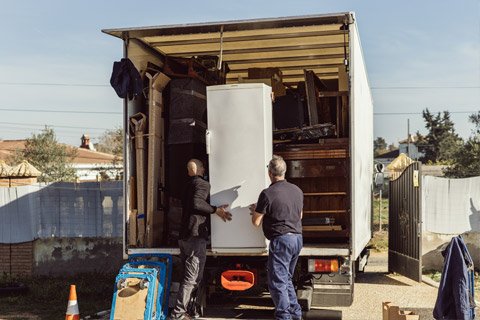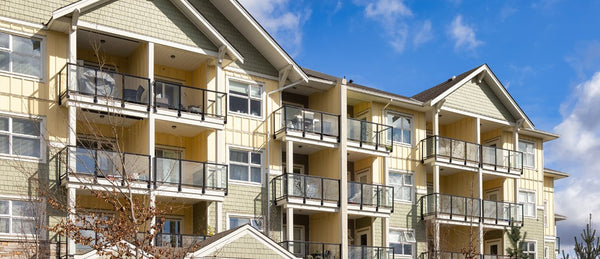Many people in the UK consider downsizing as their lifestyles and finances change. For some it is a positive step resulting from wanting to move closer to family or to start a new adventure. For other people, the reasons may be more complex and because of changes to health and independence. The loss of a partner, mobility issues, struggling with monthly costs or living in a house that is too large to easily maintain affects many people in later life.
Over a third of over-45s say they plan to downsize, often from a desire to free up equity in the property to fund their retirement. Whatever the reason, planning and considering all the implications can help you make the right decision, so you feel confident with your choice.
This guide discusses the pros and cons of downsizing, and the financial, emotional and legal steps to consider.
Jump to:
- Understanding the benefits of downsizing
- When is the right time to downsize?
- Choosing the right smaller home
- Financial considerations
- Handling the emotional aspects
- Preparing for the move
- Making your new home safe and comfortable
- Alternatives to downsizing
Understanding the benefits of downsizing
Financial advantages
For some people the financial advantages of downsizing will be clear. They may be able to sell their house for a good return, with some profit left over after buying a smaller home. Freeing up some equity can provide funds for elder care and medical expenses, or even having fun!

Make sure you consider all the costs of moving first though in case you are not left with as much as you think. You may need to factor in renovations to your new home, as well as estate agent and removal fees and decorating costs.
Even if your finances are not the main motivation for downsizing, you may still be better off due to lower utility bills or home maintenance costs.
Lifestyle benefits
As we get older, we may be less able to carry out the maintenance and upkeep our home deserves. A large garden, empty rooms or an old property can become an unwanted burden when we have other priorities. A smaller home that requires less cleaning and upkeep might be desirable and offer new social opportunities if it is close to family or in an area with a strong community.
Safer living for independence
Independent living is also a factor for many as stairs and uneven paths can become hazardous. Falls are one of the main reasons that older adults lose their independence and moving into a single storey bungalow can help make life manageable. Fewer steps can make a home more accessible and the proximity to hospitals may be a factor for someone undergoing long-term medical treatment. The loss of a partner can leave you feeling less safe and you might feel reassured living in a different area or closer to family and friends.
When is the right time to downsize?
There is no one-size fits all answer to this question and it is an emotional, health and financial decision. You may prefer to move whilst your health is good so you can enjoy the move and not feel rushed or stressed about the transition. Other people may not have this luxury and may feel their decision is forced by their health needs.
Changes to family arrangements, such as new grandchildren, the ill health of a loved one or bereavement, can be the trigger for a move and prompt the consideration of moving to a smaller property.
When considering if the time is right to downsize, consider these factors:
- It is often better to make big life decisions proactively, rather than reactively, because that gives you time to plan. When downsizing because of health or financial needs, you will want time to make the arrangements before a crisis occurs and forces your hand.
- Property prices will affect your decision when you are selling and buying. If properties are selling quickly then you could be lucky and avoid a drawn-out move. If the market is not favourable then you might decide to hold tight for a while.
- Are you ready emotionally to let go of somewhere you may have lived for a long-time? Downsizing could be a successful next step if you are ready to embrace it.
- If you are moving to be close to loved ones, or even moving in with your family, are they ready for the transition?

Choosing the right smaller home
Downsizing will naturally mean moving to a smaller home with less room. However, that does not mean you should compromise on what you want from your new home. Make a list of everything that is important to you, such as:
- Location: do you want to be close to family and friends, healthcare services or other facilities and landmarks? What area do you want to live in and do you feel safe there?
- Type of home: do you want to live in a bungalow, house or apartment? Single storey layouts remove accessibility concerns of stairs, whilst apartments may include maintenance and repairs as part of the building management fees. Retirement villages can offer excellent community living with social activities and services designed for older adults. Assisted living facilities might also be a consideration if support is needed with personal care.
- Accessibility features: if you are downsizing to maintain your independence, then consider stairways, steps and any modifications needed such as stairlifts, bathroom design and wheelchair access.
Moving in with family
If you are considering moving elderly parents into your home, check out our useful guide on the subject.
Financial considerations
If you haven’t moved house for many years then you may be unfamiliar with the current costs of moving. Make sure you speak with family and friends and get several quotes before committing to a move so there are no surprising expenses.
You will want to consider:
- Decorating and renovation costs. This can apply to the home you are selling if you want to make it more attractive, as well as the home you are buying. Major renovations like a new kitchen, bathroom or roof repairs can be expensive.
- Estate agent fees will apply if you are selling so look around for the best offers from recommended companies.
- Don’t forget the legal fees associated with house surveys and stamp duty either
- There will be the cost of moving your possessions to your new home and this can vary greatly depending on the distance the removal company will have to travel. Lots of people use self-storage during a move too and the cost of this can quickly add up if it becomes long-term.
- Your home insurance and council tax costs will change. These may decrease if you are moving to a smaller property, although don’t assume that is always the case.
By thinking about the effect of the move on your savings and pension, you can make a budget so you benefit financially from downsizing. You will want to have some emergency funds in case of any unexpected issues when moving and for a change in lifestyle, if this is the reason for downsizing.
Handling the emotional aspects
People often say moving home is one of the most stressful things you can do. Although thorough planning can reduce some of the worry, people who are downsizing often have many memories of their long-term home and the move can be emotional.
- Acknowledge your feelings and understand it is normal to feel sad, nostalgic or anxious about the move. Downsizing might represent the end of a period in your life but is also represents a new beginning.
- Focus on the positives such as improved quality of life and lower costs. Plan ahead to help you feel excited about putting your stamp on your new home.
- Photographs, furniture and other familiar possessions will make the new place feel like home, even if downsizing means you can’t take everything with you.
- Take it slow and seek support from friends and family. You don’t have to do everything all at once.
- You can stay connected with old neighbours and friends and look forward to making new connections when you move. Making new friends is possible and seek out new opportunities like social clubs and hobby groups.

Preparing for the move
Downsizing will inevitably mean you won’t have as much space in your new home. The months and weeks before the move are a good opportunity to sort through your belongings and decide what you want to keep, donate, sell or discard. If you are downsizing following a bereavement, then this may be an emotional process. Take time to process your emotions as you prepare for the move.
Donating items to charity
Many charity shops urgently need unwanted items to sell. As well as finding a good home for your old belongings, you are supporting the valuable work they do with your donations.
- Free up space temporarily with self-storage. This can declutter your home during the selling stage and help during the move itself.
- Choose a reliable removal service. Ask for recommendations from friends and family or follow the advice from Which?
- Start packing early – it always takes longer than you think! You can buy boxes and packing materials from self-storage and removal companies. Which? also have some great advice on how to pack and prepare to move house.
- Make a list of who to notify about your move: utility companies, your bank, TV licencing, doctor, dentist etc. The Post Office has a good moving home checklist and you can also set up a postal redirect for any mail that is still sent to your old address.

Making your new home safe and comfortable
Once you have moved in, you can start to make the home feel like your own. Consider any safety adaptations such as grab rails or bathroom design changes needed for accessible living. This is the exciting stage where you can arrange the furniture and home how you like it and meet your new neighbours and friends!
If you live on your own, a personal alarm with emergency button or home monitoring system can reassure you and make you feel confident that help is available in an emergency.
Alternatives to downsizing
If after considering the consequences of downsizing, you decide it is not the right decision for you, there are alternatives that can support your lifestyle changes.
- Adapt your current home: Decorating and renovations can improve the look and feel of your home. If supporting independent living as you get older is your reason for considering downsizing then consider ramps, stairlifts and removing trip hazards around the home. A panic alarm can provide peace of mind that help is just the push of a button away.
- Explore other living arrangements: could you stay with family for some periods or hire a home carer or housekeeper to visit?
Conclusion
If you decide that downsizing is the right thing for you after evaluating your personal circumstances and needs then the advice in this guide can help you through the process. Whilst the move might feel like a big step, it can help you adjust to the next stage in your life before a crisis occurs.
Research from Age UK shows that almost half of people looking to downsize are doing so to enjoy a simpler life and there can be financial benefits to moving to a smaller home.
For more information about making the most of later life, browse through our guides to living well for help with everything from leisure and activities, to lifestyle tips and advice.








